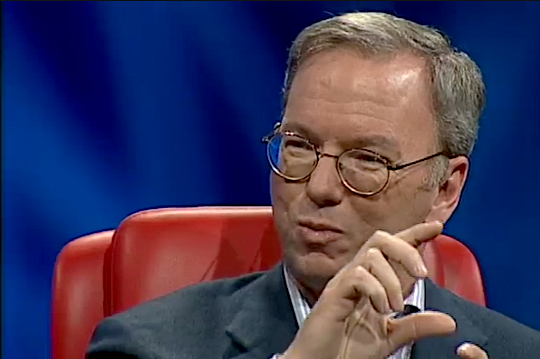Eric Schmidt talks "gang of four" platform companies at D9

Google's Eric Schmidt dodged questions about U.S. antitrust investigations tonight during one of the country's major tech conferences and answered tough questions about privacy. He went on to talk about "the gang of four" companies that are dominating consumer technologies.
New Platform Economics
Schmidt kicked off the first session of the D9 conference, which opened today in Rancho Palos Verdes, Calif. That put him at the pleasure of grilling by cohosts Kara Swisher and Walt Mossberg, who aren't shy about asking tough questions. Swisher started with the antitrust question. Mossberg followed asking about four companies, collectively worth half a trillion dollars.
"Four companies are exploiting platform strategies very well" -- Amazon, Apple, Facebook and Google, Schmidt said. "We can debate who's fifth or sixth" -- and he mentioned eBay and Twitter.
Schmidt observed that in the past single, large platform companies dominated -- IBM through the early 1980s, followed by Microsoft. The "gang of four" changes platform dynamics and product development. "These are global companies with reach and economics," he said.
Mossberg, who believes that we have entered the "post-PC era," wondered why Microsoft isn't on the list. "Microsoft is not driving the revolution in the mind of consumers," Schmidt answered. He observed, as others have, that Microsoft is focused on its Office and Windows platforms, which cater to businesses.
Where is Larry Page?
The choice of Schmidt for D9's opening session strikes me as odd and yet not. In early April, Schmidt stepped down as CEO to take the role of Executive Chairman of Google's board. In some respects, Schmidt is now a high-level evangelist for all things Google. From that perspective, he is the right man to talk privacy, policies and new technologies at D9.
However, I have to ask: Why isn't it Larry Page? The Google cofounder assumed the chief executive's role abdicated by Schmidt and that he occupied a decade earlier. D9 would be a highly appropriate venue for him to make a grand debut and in the opening session. It's by far the most prestigious placement of the three-day conference. Past opening session guests include Apple CEO Steve Jobs; Jobs alongside Microsoft Chairman Bill Gates; and Gates alongside Microsoft CEO Steve Ballmer. Well, those headliners stood out in my mind.
Perhaps Page is too busy with his new responsibilities. Maybe he was scared off. D8 put Facebook CEO Mark Zuckerberg in the hot seat, seemingly literally. He sweated and squirmed a lot.
Schmidt described Page as a "product genius."
"Probe in Your Pocket"
"Don't you know too much about us?" Mossberg asked. Schmidt described privacy as a "compromise" between the needs of government and citizens. He carefully insisted that Google doesn't abuse the data he collects. Swisher asked about the Android phone as the "probe in your pocket" -- a term taken from Apple CEO Steve Jobs, who wanted her to write a story about it. Schmidt insisted that Google isn't sucking information out of people's pockets into search.
Mossberg and Swisher pressed Schmidt about the future of mobile platforms, with Android and iOS being the presumed leading ones. Who else? "Many people don't have a third choice," Schmidt said. It would require too many resources for a third platform to succeed he said.
Google Wallet
Mossberg, Schmidt and Swisher participated in a demo for a new mobile payments system, Google Wallet, that the search and information giant introduced on May 26. Google is partnering with Citi, Mastercard and Sprint to bring mobile payments to Android-powered smartphones, using NFC (near-field communications) technology. "It looks like the NFC chip will be the global standard," Schmidt said.
Simply stated, Google Wallet is an offers and payments system available at the point of sale. In its simplest form, Google Wallet requires a tap to pay the merchant and charge the buyer's credit card.
Mobile payments are a hot topic, but more internationally than in the United States. If anything, Americans are deprived compared to Europeans, Asians and Africans. Mobile payments have found surprising traction in Kenya and parts of North Africa pushing out into the Middle East.
For Google, the payment system is as much about advertising. Google won't charge merchants for transactions or software/cloud service. "We make our money through the advertising and the offers," Schmidt said.
Loyalties and offers will be crucial for Google and merchants. Someone passing a billboard for a sale on jeans could scan the barcode and then walk over to the store, where the item would be ready to purchase using Google Wallet. Initially, the payment system will only be available for Android phones.
Google Wallet requires purchase of new point of sale terminals, which hasn't been a problem because theft is much lower when using NFC payments. "The whole system pays for itself so quickly," Schmidt said.
In response to Mossberg asking why people would use Google Wallet instead of credit cards, Schmidt answered: "Your phone is your alternate personality in the digital world."